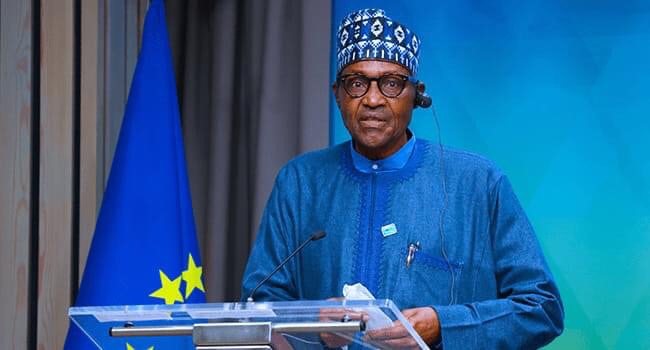ABUJA
A coalition of Nigerian activists demonstrated recently in the capital city Abuja, demanding President Mohammadu Buharisign a bill that aims to improve transparency, inclusion, and planning for national elections.
President Muhammadu Buhari was yesterday conferred with an award as a champion for Global Eradication of Sickle cell disease by the National Institute of Pharmaceutical Research Development (NIPRD).
Speaking shortly before presenting the award to the minister of health, Dr Osagie Ehanire, on behalf of the president, the Director General of NIPRD, Dr Obi Adigwe, said the aim is to specially recognise President Buhari, and to present him with a prestigious award for the immense contribution of his administration towards the eradication of sickle cell disease in Nigeria.
He said the event also served to appraise the president of the recent achievements of the Institute towards the promotion of herbal medication therapies in Nigeria.
“These accomplishments have been supported by the current administration which has empowered NIPRD to champion the eradication of sickle cell disease by contributing conceptual innovations to mitigate the devastating effects of the disorder across the sub-Sahara African region,” he said.
NIPRD is a parastatal under the Federal Ministry of Health with a mandate to engage in activities that promotes capacity building, policy making, data collation, drug distribution and development of contextual partnerships that can expedite access to health care.
While highlighting some of milestones recorded by NIPRD, Adigwe said the institute has continued to set the pace for responsive innovativeness in the nation’s research.
He maintained that NIPRD was developing cutting edge interventions that will dominate the African landscape over the next two decades.
According to NIPRD D-G about 80 percent of sickle cell disease cases occur in Sub-Saharan Africa, with evidence suggesting that Nigeria has the largest population of persons affected with the disorder, recording a high mortality rate for children under five years of age.
He said as part efforts at improving the quality of healthcare of Nigerians, NIPRD undertook the task of championing the eradication of sickle cell disease in the African sub-region.
“The team of experts placed special focus on efficient and sustainable utilisation of local resources for self-reliance in pharmaceutical production and services. The outcome of this was the breakthrough with NIPRISAN. NIPRISAN is an anti-sickling medicine extracted from four local herbs in Nigeria which were found to be efficacious in the management of the disease,” he stated.
In his acceptance speech read on his behalf by the minister, the president commended Adigwe, for his tremendous efforts at ensuring innovative research and development of phytomedicines, drugs, diagnostics, pharmaceuticals and biological products, from indigenous Nigerian herbs.
“I am impressed by the achievements of the agency in meeting her objectives and in ensuring the provision of responsive solutions to the problems of health across Nigeria,” he noted.
Buhari recalled that in previous years, people with sickle cell disorder were predisposed to numerous health complexities including the intricacies of a short life expectancy.
The president noted:“However, these shortcomings have been substantially minimised following the development of NIPRISAN. Attaining this milestone has not only provided a means of sickle cell management but has also aided medicine security and a boost of our local research development.“My joy remains that indeed, this administration has played critical roles to promote the eradication of sickle cell disorders by ensuring the ease of manufacture and commercialisation of NIPRISAN, now called NICLOVIX.
Buhari observed that the production of NICLOVIX by manufacturers in the country has substantially increased access to the drug for people with SCD within and outside the expanse of Nigeria and that he was particularly optimistic of the ability to achieve more as a nation to subjugate the menace of sickle cell disease that has been prevalent in the Sub-Saharan African region.
“We will continue to do our best to ensure that priority is placed on the local production of medicines by providing the appropriate support for NIPRD in order to carry out her mandate,” he said.
NIPRD is a parastatal under the Federal Ministry of Health with a mandate to engage in activities that promotes capacity building, policy making, data collation, drug distribution and development of contextual partnerships that can expedite access to health care.





Discussion about this post